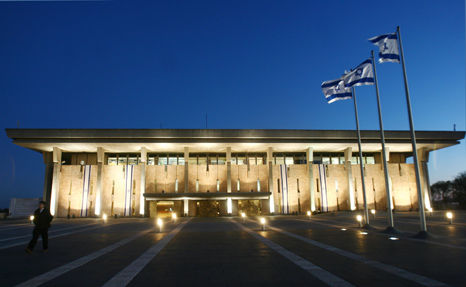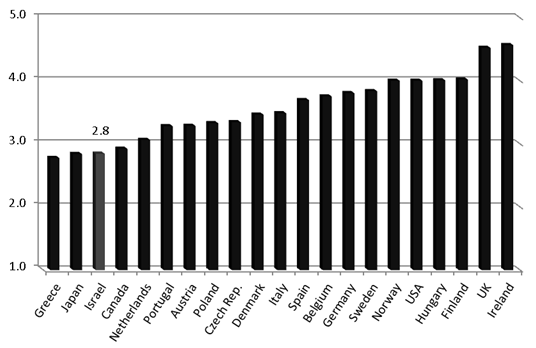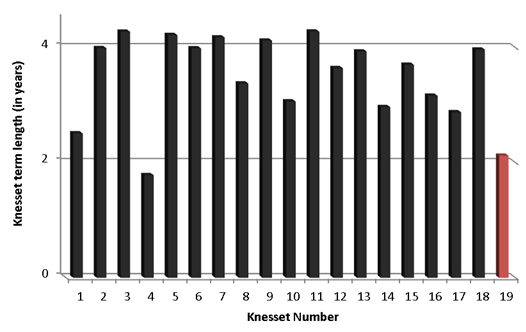The 2015 Knesset Elections: Facts and Figures
The statistics and graphs below pertain to the upcoming Knesset elections, which will be held on March 17, 2015. The data were collected and analyzed by Dr. Ofer Kenig of IDI's Political Reform project.

How often are Parliamentary Elections Held in Different Countries?*
(Average interval, in years, from 1990 until today)

- The timeframe for the countries in this figure is from the first Election Day after January 1, 1990, through the most recent Election Day (as of December 14, 2014). For Israel, the timeframe has been extended to March 17, 2015.
- Data for Israel includes the 2001 special elections for the Prime Minister.
- In most of the countries represented on the graph, the constitutional parliamentary term is four years. The exceptions are Ireland, Great Britain, Italy, and Denmark, where a parliamentary is up to five years. The graph does not include New Zealand and Australia, where the maximum parliamentary term is three years.
Is the frequency of elections in Israel unusually high?
Israel is in the category of countries with frequent elections. Only Japan and Greece have had elections more often.
Length of Knesset Terms (1949–2015) (Interval between general elections)

When the elections are held in March 2015, will the current Knesset (Israel's 19th) Knesset have served for the shortest period ever?
The elections on March 17, 2015, will be held only 778 days after the previous elections. This is the second shortest interval in Israel’s political history. The only interval that was shorter was the interval between the elections for the fourth Knesset (1959) and the fifth Knesset (1961).
When was the last time that elections were held on their scheduled date?
The current elections are the eighth elections in a row that are being held before the statutory date. The last Israeli election that took place at the scheduled time was in 1988.
Why have the elections for the 20th Knesset been moved up?
It is hard to pinpoint the exact reason why any specific election is moved up, since multiple factors are usually involved. Different political actors tend to have different interpretations of the reasons for early elections. The current case can be explained by the serious crisis of trust between Prime Minister Netanyahu and two of his senior ministers (Yair Lapid and Tzipi Livni), by profound differences in perceptions of the delicate balance between the democratic and Jewish aspects of the State of Israel (e.g., the controversy over the proposed Nation State Law), by the disagreements about the 2015 State budget, or by a backroom deal to set up an alternative government.
